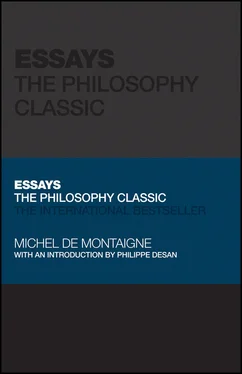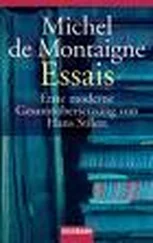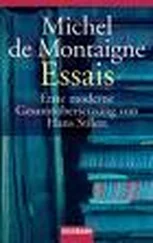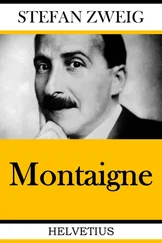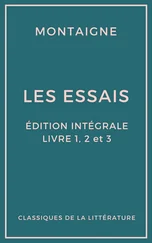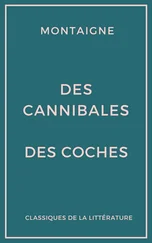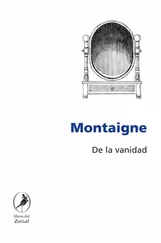Michel de Montaigne - Essays
Здесь есть возможность читать онлайн «Michel de Montaigne - Essays» — ознакомительный отрывок электронной книги совершенно бесплатно, а после прочтения отрывка купить полную версию. В некоторых случаях можно слушать аудио, скачать через торрент в формате fb2 и присутствует краткое содержание. Жанр: unrecognised, на английском языке. Описание произведения, (предисловие) а так же отзывы посетителей доступны на портале библиотеки ЛибКат.
- Название:Essays
- Автор:
- Жанр:
- Год:неизвестен
- ISBN:нет данных
- Рейтинг книги:3 / 5. Голосов: 1
-
Избранное:Добавить в избранное
- Отзывы:
-
Ваша оценка:
- 60
- 1
- 2
- 3
- 4
- 5
Essays: краткое содержание, описание и аннотация
Предлагаем к чтению аннотацию, описание, краткое содержание или предисловие (зависит от того, что написал сам автор книги «Essays»). Если вы не нашли необходимую информацию о книге — напишите в комментариях, мы постараемся отыскать её.
Essays: The Philosophy Classic
Essays: The Philosophy Classic
Essays — читать онлайн ознакомительный отрывок
Ниже представлен текст книги, разбитый по страницам. Система сохранения места последней прочитанной страницы, позволяет с удобством читать онлайн бесплатно книгу «Essays», без необходимости каждый раз заново искать на чём Вы остановились. Поставьте закладку, и сможете в любой момент перейти на страницу, на которой закончили чтение.
Интервал:
Закладка:
On Cruelty
The chapter begins by discussing virtue. Montaigne does not see himself as particularly virtuous. If he has good qualities, most were developed through education and good family – neither of which were his creation. He is not free of vice by any means, but one vice he would never engage in is cruelty. If someone is put to death, let it be quick. Torture for public enjoyment is disgusting. We should be kind to animals because they have feelings.
On Giving the Lie
Montaigne's own age, in fact every age in history including the classical world, is one of lies and dissimulation. He despises lying for the bad effects it carries through time. It is both cowardly towards other people, and disrespects God. His Essays are, if nothing else, an attempt to convey the truth – even if messy or awkward, or lacking direction or resolution.
On a Monstrous Child
Montaigne relates seeing two curiosities: male conjoined twins; and a man born with no genitals who nevertheless was aroused by women. Though they may seem “monsters”, in God's eyes they cannot be, because as God made everything in nature, it all must be perfect. The universe has a great multitude of life, which we can wonder at.
On Three Good Women
A further meditation on love and marriage. Montaigne takes three examples from antiquity of devotion of wives to their husbands. He also salutes the great suicide of Seneca, who stayed true to his Stoic principles, with equanimity shown until the end.
BOOK III
On Profit and Honesty
Sometimes, there appears to be a conflict between personal virtue and matters of politics or business. Cicero wrote that what is right and what is expedient can never be separate things, and Montaigne largely agrees. In a time of war (as he was), one has to take sides, but in all personal and public dealings one should act with justice and sympathy, never becoming so inflamed that one acts with vengeance or cruelty.
On Repentance
Montaigne's subject here is the question of whether one has acted honorably, given the facts and circumstances at the time of decision. He has largely trusted his own judgment on things, and therefore is fully responsible for this life. It is less worrisome anyway to appreciate that things turned out as they meant to, and that one's decisions matter little in the scheme of things. There is little that can agitate Montaigne, and his relative lack of ambition or intensity has worked well for him. If you are moderate, you will have peace.
On Some Verses of Virgil
The chapter title disguises the real subject: human sexuality. Montaigne begins by noting he is too old to engage in much sex now, but he enjoys himself with memories. He admits his marriage was arranged but respects the institution of marriage and has kept to his vows. Sex is so strong an impulse that the world revolves around it. Women have desires as strong as men, and he looks wryly on women who claim to have their mind only on higher things. It is only education and custom that make women and men seem so different.
On Coaches
Horse-drawn coaches were still a symbol of luxury in Montaigne's time, so he uses them as the means to criticize pomp and ostentation. When rulers have grand transports and caravans, it is a sign that they lack confidence in their power and judgment and make up for it with display. They spend on lavish festivals to make the people feel good about them, when the money would be better spent on ports, bridges, schools, hospitals. He contrasts this with the apparent nobility of the New World rulers, admiring the civilization they built before the Spanish conquest.
On the Art of Conversation
Montaigne loves conversation so much, that he would rather lose his sight than his speech or hearing. In contrast to the solitariness of reading, conversation builds our character and skills. He welcomes strange or shocking views, because from every chat you learn something and it gets you closer to truth. He prefers being contradicted to being praised, and loves light-hearted banter. Speaking reveals who you are. Many a ruler would have preserved the sense of awe around them by keeping silent.
On Vanity
Montaigne admits that the greatest vanity is writing about vanity. Yet here he is, with his self-indulgent scribblings. Each person contributes in some way to the decline of their era. Some through their vain actions foster more injustice or cruelty than there was before. Others (like he himself) simply add more silliness or laziness. He should be content with running his estate, like his father was, but he fancies himself as a man of state, travelling and meeting important people. The Delphic maxim is Know yourself, but when he has examined himself, all he has found is emptiness and foolishness.
On Experience
Montaigne's meditation on his life-long search for wisdom, paradoxically, comes down to being a point of consciousness within a body. For this reason he goes into some details on his diet, sleeping habits, illnesses, etc. Though he has done nothing of great distinction, he has had thousands of experiences – and so feels as qualified to comment on life as anyone. Using the analogy of his kidney disease, and his aversion to medicine, he argues that life is to be faced up to, not avoided. In doing so we might find some (very modest) self-knowledge or wisdom.
ABOUT PHILIPPE DESAN
Philippe Desanis the Howard L. Willett Professor Emeritus of History of Culture at the University of Chicago. He specializes in the history of ideas in the Renaissance and more particularly in Montaigne. Books include the definitive biography, Montaigne. A Life (Princeton University Press, 2018) as well as Montaigne: penser le social (Odile Jacob, 2018) and the Oxford Handbook of Montaigne (Oxford University Press, 2016). Editor-in-chief of Montaigne Studies since 1988, he received the Grand Prize from the French Academy in 2015 for his scientific work.
ABOUT TOM BUTLER-BOWDON
Tom Butler-Bowdonis the author of the bestselling 50 Classics series, which brings the ideas of important books to a wider audience. Titles include 50 Philosophy Classics, 50 Psychology Classics, 50 Politics Classics, 50 Self-Help Classics and 50 Economics Classics .
As series editor for the Capstone Classics series, Tom has written Introductions to Plato's The Republic , Machiavelli's The Prince , Adam Smith's The Wealth of Nations , Sun Tzu's The Art of War , Lao Tzu's Tao TeChing , and Napoleon Hill's Think and Grow Rich .
Tom is a graduate of the London School of Economics and the University of Sydney.
www.Butler-Bowdon.com
TO THE READER
THIS, reader, is a book without guile. It tells you, at the very outset, that I had no other end in putting it together but what was domestic and private. I had no regard therein either to your service or my glory; my powers are equal to no such design. It was intended for the particular use of my relations and friends, in order that, when they have lost me, which they must soon do, they may here find some traces of my quality and humour, and may thereby nourish a more entire and lively recollection of me. Had I proposed to court the favour of the world, I had set myself out in borrowed beauties; but it was my wish to be seen in my simple, natural, and ordinary garb, without study or artifice, for it was myself I had to paint. My defects will appear to the life, in all their native form, as far as consists with respect to the public. Had I been born among those nations who, it is said, still live in the pleasant liberty of the Jaw of nature, I assure you I should readily have depicted myself at full length and quite naked. Thus, reader, I am myself the subject of my book; it is not worth your while to take up your time longer with such a frivolous matter; so fare thee well.
Читать дальшеИнтервал:
Закладка:
Похожие книги на «Essays»
Представляем Вашему вниманию похожие книги на «Essays» списком для выбора. Мы отобрали схожую по названию и смыслу литературу в надежде предоставить читателям больше вариантов отыскать новые, интересные, ещё непрочитанные произведения.
Обсуждение, отзывы о книге «Essays» и просто собственные мнения читателей. Оставьте ваши комментарии, напишите, что Вы думаете о произведении, его смысле или главных героях. Укажите что конкретно понравилось, а что нет, и почему Вы так считаете.
